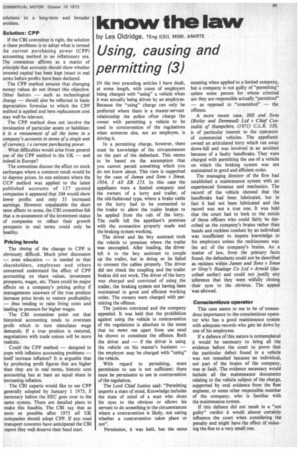know the law
Page 61

If you've noticed an error in this article please click here to report it so we can fix it.
Using, causing and permitting (3)
by Les Oldridge, TEng (CEO, MIMI, AMIRTE
IN the two preceding articles I have dealt, at some length, with cases of employers being charged with "using" a vehicle when it was actually being driven by an employee. Because the "using" charge can only be preferred where there is a master-servant relationship the police often charge the owner with permitting a vehicle to be used in contravention of the regulations when someone else, not an employee, is driving it.
In a permitting charge, however, there must be knowledge of the circumstances on the part of the defendant. This seems to be based on the assumption that you cannot permit something which you do not know about. This view is supported by the case of James and Sons v Smee, 1954, 3 All ER 273. In this case the appellants were a limited company and the owners of a lorry and trailer, of the old-fashioned type, where a brake cable on the lorry had to be connected to the trailer to allow the trailer brakes to be applied from the cab of the lorry. The outfit left the appellant's premises with the connection properly made and the braking system working.
The driver and his boy assistant took the vehicle to premises where the trailer was uncoupled. After loading, the driver left it to the boy assistant to couple up the trailer, but in doing so he failed to connect the cables properly. The driver did not check the coupling and the trailer brakes did not work. The driver of the lorry was charged and convicted of using the trailer, the braking system not having been maintained in good and efficient working order. The owners were charged with permitting the offence.
The justices convicted and the company appealed. It was held that the prohibition against using the vehicle in contravention of the regulations is absolute in the sense that no mens rea apart from use need be shown to constitute the offence. Both the driver and — if the driver is using the vehicle on his master's business — the employer may be charged with "using" the vehicle.
With regard to permitting, mere permission to use is not sufficient: there must be permission to use in contravention of the regulation.
The Lord Chief Justice said: "Permitting imports a state of mind. Knowledge includes the state of mind of a man who shuts his eyes to the obvious or allows his servant to do something in the circumstances where a contravention is likely, not caring whether a contravention takes place or not".
Permission, it was held, has the same
meaning when applied to a limited company, but a company is not guilty of "permitting" unless some person for whose criminal act they are responsible actually "permitted" — as opposed to "committed— the offence.
A more recent case. Hill and Sons (Botley and Denmead) Ltd v Chief Con stable of Hampshire, (1971) C.L.R. 538, is of particular interest to the operators of commercial vehicles. The appellants owned an articulated lorry which ran away down-hill and was involved in an accident because of a faulty handbrake. They were charged with permitting the use of a vehicle on which the braking system was not maintained in good and efficient order.
The managing director of the firm had established a maintenance system with an experienced foreman and mechanics. The record of the vehicle showed that the handbrake had been lubricated, but in fact it had not been lubricated and the record was not a true one. It was held that the court had to look to the minds of those officers who could fairly be described as the company's brains rather than hands and reckless conduct by an individual was insufficient to impute knowledge to his employers unless the recklessness was the act of the company's brains. As a matter of law, from the primary facts found, the defendants could not be described as reckless within James and Sons v Smee or Gray's Haulage Co Ltd v Arnold (described earlier) and could not justify any inference that they were wilfully closing their eyes to the obvious. The appeal was allowed.
Conscientious operator This case seems to me to be of tremendous importance to the conscientious operator who has a good maintenance system with adequate records who gets let down by one of his employees.
If a defence of this nature is contemplated it would be necessary to bring all the evidence before the court to prove that the particular defect found in a vehicle was not remedied because an individual, not part of the brains of the company, was at fault. The evidence necessary would include all the maintenance documents relating to the vehicle subject of the charge, supported by oral evidence from the fleet engineer, or some other responsible member of the company, who is familiar with the maintenance system.
If this defence did not result in a "not guilty" verdict it would almost certainly influence the court when considering the penalty and might have the effect of reducing the fine to a very small one.








































































































